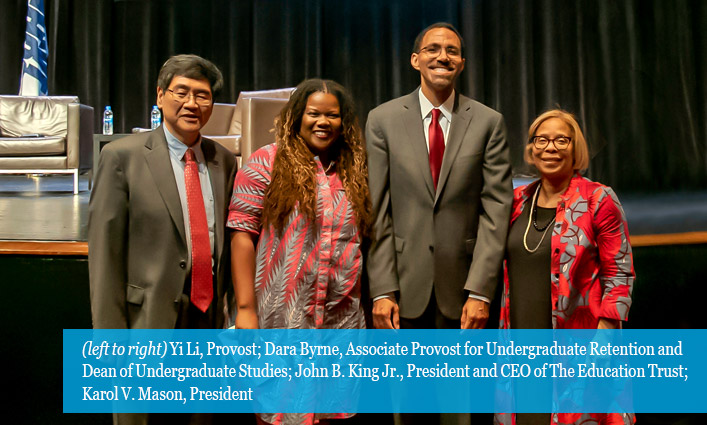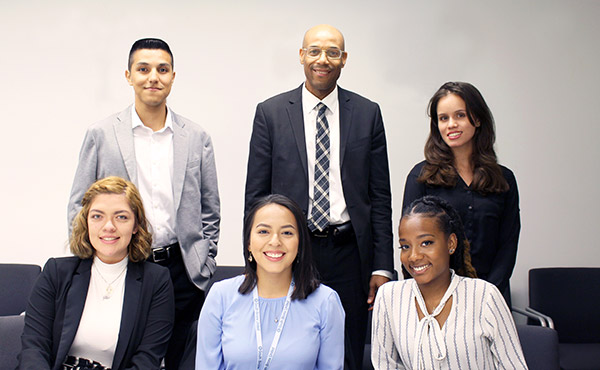
To start the academic year off right, President Karol V. Mason hosted an Academic Year Kickoff event on August 27, highlighting the incredible achievements of our entire John Jay community. “We’re here today to connect the dots,” said Mason. “We’re going to connect the dots between where we’ve been, what’s coming up, and where we hope to go in the future. We’re here to reinvigorate our passion for enriching the lives of our students. And, we’re here to celebrate our successes as a community.” Helping to illustrate some of the amazing accomplishments reached last year—including graduating the largest class in the College’s history—members of John Jay stood up within the crowd and detailed the different achievements reached by their programs, cohorts, and departments.
“We’re going to connect the dots between where we’ve been, what’s coming up, and where we hope to go in the future.” —President Karol V. Mason
Some of the highlighted successes included: The Accelerate, Complete, Engage (ACE) program, having a 60 percent four-year graduation rate, which is higher than the 33 percent, four-year graduation rate, at other U.S. public colleges; the Pre-Law Institute (PLI) is helping to diversify the bar, with students in the program admitted to 99+ law schools, including the top 20 law schools in the country; and John Jay being a leader among Hispanic-Serving Institutions (HSI), diversifying the U.S. scientific workforce thanks to the dedicated work of the Program for Research Initiatives in Science and Math (PRISM).

Getting to Know John B. King Jr.
To “connect the dots” and help guide our community to where we hope to go in the future, Mason introduced special guest John B. King Jr., President and CEO of The Education Trust and former U.S. Secretary of Education and New York State Education Commissioner, to discuss topics that we face as a community. “John’s own personal story serves as a testament to the transformative power of education, and throughout his life, he has had an unwavering dedication to equal opportunity—as a teacher, a principal, and a leader of schools and school systems,” said Mason, before she welcomed her friend and former colleague on stage with a warm hug.

Sharing his life story with the audience, King candidly explained that his public-school education saved his life. “Both my parents passed away when I was a kid—my mom died when I was eight years old, and my dad died when I was 12. In the period where it was just my dad and I, he had undiagnosed Alzheimer’s disease. I didn’t know what he would be like from one day to the next. So, home for me was this place that felt uncertain and not safe,” said King. “But school saved my life. School was an environment that was safe, engaging, and interesting. I was blessed to have a series of New York City public school teachers that believed and invested in me.” King then spoke of the anger he experienced during his teenage years and how it led to his being kicked out of high school, and why his story is really one about second chances. “My teachers had a sense of hope for me, they believed in me more than I believed in myself. They stuck with me and gave me a second chance,” said King. “I became a teacher to try and do for kids what teachers had done for me. That desire is what drove me as a principal, it’s what drove me into education policy, and it’s what drives me now. It is about making sure that school is the life-saving force that I know it can be.”
“School saved my life. School was an environment that was safe, engaging, and interesting.” —John B. King Jr.
Asking the Difficult Questions
Mason and King sat down for a Q&A session where they discussed how to reduce the graduation gap, John Jay’s role as a Hispanic-Serving Institution (HSI) and Minority-Serving Institution (MSI), and how investing in and supporting students leads to their success. Here are a few excerpts from their conversation.

Mason: One of the things we hear in the national conversation is the question, “Why do we need a college education?” Can you tell us how you respond to that, and what advice you have for us on how to counter that narrative?
King: Usually the people that say, “You don’t need a college education” are those that went to college, and their kids are going to college. So that statement is really more about other people’s children. It’s like, “College isn’t really necessary for them.” The truth of the matter is, there just aren’t that many jobs in a 21st century economy that will provide a family-sustaining wage and yet not require some form of post-secondary degree or credential. I think what we as a society have to do is figure out: How do we make sure that college is accessible to everyone and affordable for everyone? And, how do we make sure students who start actually finish? As a country, we haven’t done a good enough job on that and we’re missing out on talent and losing our competitive edge. It’s about creating access to opportunities for students.
For individual institutions, the question is: How do you invest in students so that those who start college actually finish? I know that’s a priority for John Jay and CUNY. We know the things that get in the way for students—they come up against financial obstacles and a lack of academic support. As a country, our financial investment in higher education has decreased; states are disinvesting and the cost is being passed on to students. There needs to be greater investment in our schools and programs. Regarding the academic pieces, we need to support students to increase their success. Students need advisement to help them navigate college life, their courses, finding internships, and figuring out how their degree fits into their life plan. Institutions that provide those kinds of support programs, like ACE here at John Jay, are getting better outcomes.
“What we as a society have to do is figure out: How do we make sure that college is accessible to everyone and affordable for everyone? And, how do we make sure students who start actually finish?” —John B. King Jr.
Mason: We’re an MSI and HSI, give us some advice on really serving our students.
King: To me, the serving part is the part that is often missing at many institutions. It’s not just about the designation as an MSI or HSI, it’s not just about the demographics of the student population. It has to be about the organizational philosophy. You have to ask, “Are the faculty and staff representative of the diversity and experiences of the students?” We know that across the country there’s a big disconnect on that front. “Do students see themselves in the curriculum?” We know that institutions that invest in ethnic studies see a real benefit in terms of student outcome—the students have a sense of belonging in that institution. And then, “Do we help students across cultural, race, and income, to have experiences where they see the world from other people’s perspectives?” That to me is an essential part of a good education. It’s about giving students the experience of seeing the world through someone else’s eyes. It’s about providing a culturally responsive, instructional-learning experience for all students at the institution. And then of course, we have to be relentless about the data: Who’s finishing? Who’s leaving? Who’s getting those summer internships? Who’s getting the best grades? We have to keep questioning if we’re doing enough to build a truly equitable community.

Mason: There are so many horrible things happening all over the country and the world, for example, the recent shootings in El Paso, Texas, the shootings in New Zealand, and the separation of children from their parents at the border. How do we, as an institution of higher education, respond to those tragic events in a way that is respectful of our students’ needs? And, how do we equip them to deal with that kind of world?
King: We have to support students in engaging in the national conversation, and we have to make sure that we are living our principles locally. We are living through a time of incredible injustice, so as a community we need to ask, “What will we do now? What are we doing to tackle these injustices?” We then also have to help students connect what they’re seeing today with our broader history, the history of this country, and its treatment of immigrants. When you see these hate crimes, it’s important that we understand the history of hate crimes, and how they’re used to control, to oppress, and to prevent progress. So, we have to help students engage on a national level, but we also have to think about what we are doing as a community to make things better. And, this College is doing great things for its students. John Jay sits at the intersection of education and the potential for justice reform—on all levels. The work you all are doing here is so incredibly urgent for the future health and well-being of this country. John Jay is uniquely positioned to be a part of changing how this country deals with immigration, mass incarceration, mental health needs, addiction, and poverty, by training those who will be part of the system either politically, as advocates, or in law enforcement.
“John Jay sits at the intersection of education and the potential for justice reform—on all levels. The work you all are doing here is so incredibly urgent for the future health and well-being of this country.” —John B. King Jr.
Meeting with Students
Following the Academic Kickoff, King joined some students, faculty, and staff in breakout sessions, including a session where he chatted with ACE students and alumni, learning firsthand how they were positively impacted by the program. They spoke of the benefits of being an ACE student—the free monthly MetroCard, the book vouchers, the family atmosphere, and the one-on-one advisement. “Crime rates, violence, poverty, and incarceration are all linked to a lack of education,” said ACE student Achora Recille. “If you give kids who live in underserved and underrepresented communities the tools they need, access to education, and programs like ACE, then you’re creating a direct pathway to success. You’re removing the road blocks and eliminating the fear of not having money to go to school or pay for books, you’re lifting up the people who need it the most.”

Hoping to learn how the students would like ACE to evolve, King asked what additions they would make to the program. John Jay and ACE Alumnus Shane Worrell-Louis ’19, now an officer with the New York City Police Department, said he hopes ACE will be made available to additional students already enrolled at the College. “I had a friend who came to John Jay at the same time I did, and I told him to sign up for ACE before we started freshman year. He didn’t listen. As our first year went on, he saw all the opportunities I was being given, and realized what he missed out on. I was able to focus on school, while he had to work to pay for his tuition and books. I received guidance, while he had to figure things out on his own,” said Worrell-Louis. “And, even though he did graduate, our experiences here at the College were vastly different. If he had been able to apply to ACE in his sophomore year, that would have made a world of difference for him. I know this to be true because ACE changed my life, and I’d love to see sophomore and even junior students join the program and have it change theirs.”
More Scenes from the Event:





See more of President Karol V. Mason’s talk with John B. King Jr.



